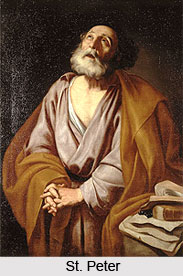 Jesus Christ had told Peter, the leader among the apostles, that he was the "rock" on which He would build His Church, and he thus became the first Bishop of Rome. In course of time the Roman Church came to occupy a special place among the other churches in Europe which began to consult it regarding important decisions. In the Roman Catholic priestly hierarchy, the Pope (who is the bishop of Rome) as God`s representative on earth, is the supreme authority in matters of faith and morals for Catholics all over the world.
Jesus Christ had told Peter, the leader among the apostles, that he was the "rock" on which He would build His Church, and he thus became the first Bishop of Rome. In course of time the Roman Church came to occupy a special place among the other churches in Europe which began to consult it regarding important decisions. In the Roman Catholic priestly hierarchy, the Pope (who is the bishop of Rome) as God`s representative on earth, is the supreme authority in matters of faith and morals for Catholics all over the world.
Christ`s authority, which was given to St. Peter (the first Bishop of Rome), according to them, has descended in an unbroken line through the popes. He has been called pope (father, Greek, `papas`) since the 4th century. Important and senior helpers who carry out the executive functions of the pope are the cardinals and since the eleventh century a college of cardinals elects the pope. They are about 106 in number. In the College of cardinals, which sits in Rome, India is represented by two cardinals (of Mumbai and Ernakulam). Next are the bishops who are appointed by the pope on the recommendation of senior priests. They are in charge of a group of churches known as the diocese. They ordain priests and other bishops. There are 120 bishops in India. The priest forms the broad base of the pyramid. His rights and duties are strictly regulated by canon law.
Ceremonies Of The Roman Catholic Denomination: There are several ceremonies that are part and parcel of the Roman Church, such as, baptism, confessions, penance and others. These ceremonies are strictly followed by the disciples.
Priests Of The Roman Catholic Denomination: 35 religious orders of priests serve the Roman Catholic Denomination in India. The priests are highly revered by the followers and their presence is required in all kinds of religious rites.









